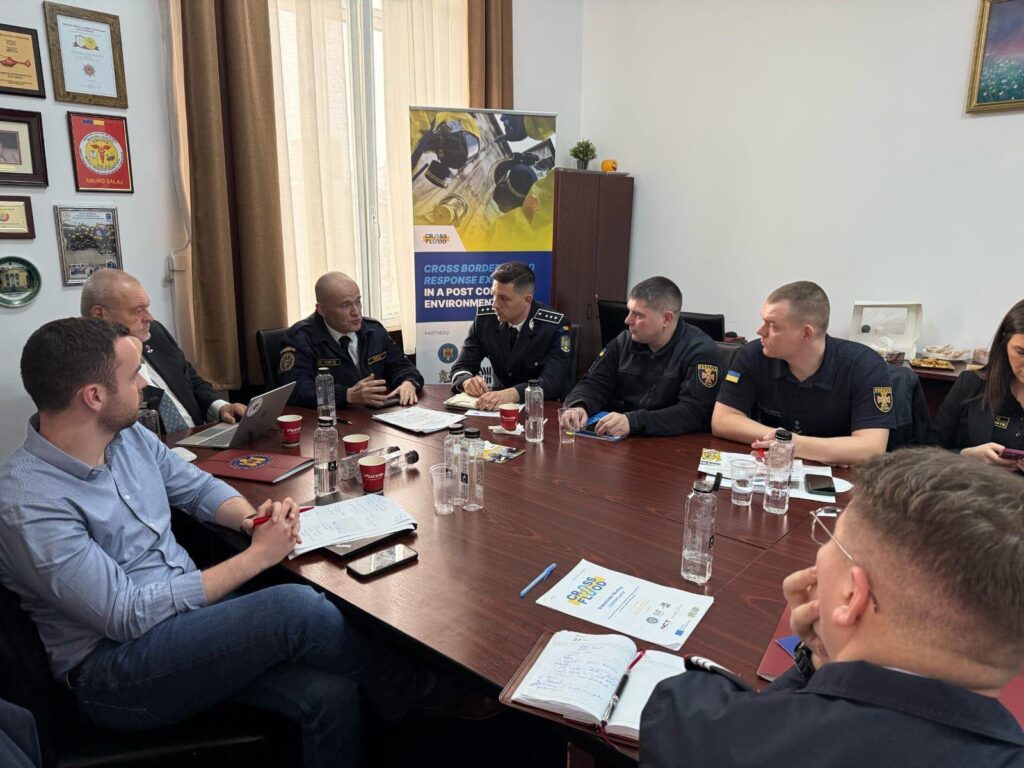By CBNW Magazine
The Exercise Director of CROSSFLOOD, Dr. Bogdan Pop, introduces the project and discusses the importance of civil protection cooperation in cross-border post-conflict areas.
CROSSFLOOD follows the success of the previous full-scale civil protection exercise funded by the Union Civil Protection Mechanism (UCPM), FORMATEX23, that took place in Linz, Austria, in September 2023. Could you introduce CROSSFLOOD, and how does it differ from FORMATEX23?
CROSSFLOOD aims to train civil protection organizations and Union Civil Protection Mechanism modules on conducting missions in a post-conflict environment hit by flooding. CROSSFLOOD will also contribute to the development of a training curriculum targeted at civil protection missions in a post-conflict or low-conflict environment.
FORMATEX23’s objective, however, was to improve the capabilities of agencies, emergency services, and the UCPM in preparedness for and response to disasters triggered by natural hazards. FORMATEX23 especially targeted emergency response and management during complex multi-hazard events with a focus on CBRN hazards and environmental pollution.
The main difference with the CROSSFLOOD project lies in improving cross-border response during multi-sectorial emergencies with a focus on civil protection operations and multi-sectoral emergencies in areas affected by post-conflict factors.

What is the UCPM and what role does it play in disaster management in Europe? How will CROSSFLOOD support the UCPM, and vice-versa?
The European Union Civil Protection Mechanism aims to strengthen cooperation between the European Union and Member States to facilitate coordination in the field of civil protection to prevent, prepare for, and respond to natural and human-induced disasters within and outside the EU.
Through the implementation of this project, the UCPM will play an essential role in providing assistance not only during crises in Romania, but also in facilitating incoming assistance during cross-border support operations in support of Ukraine. In response to an evidence-based flood risk scenario in the cross-border region of Romania and Ukraine, the full-scale exercise will test the entire process of requesting assistance and activating the UCPM.
The CROSSFLOOD project also aims to improve the preparedness of Emergency Response Coordination Centre and UCPM modules vis-à-vis landmines and other unexploded ordnance in UCPM areas of operations.

The exercise is being coordinated by the Romanian Department of Emergency Situations and will take place in Romania. What priorities does Romania have as host country in coordinating the exercise?
Romania has several priorities as host country of the full-scale exercise. Firstly, training civil protection organizations to navigate the complexities of natural disasters in conflict-affected areas, CROSSFLOOD enhances collaboration and coordination among stakeholders. It contributes to the development of effective civil protection missions and fosters resilience in communities impacted by both natural and conflict-related emergencies.
Secondly, CROSSFLOOD will enhance information exchange within national and regional operational centers of all levels in Romania, Ukraine as well as with the Emergency Response Coordination Centre. Finally, the project will improve deployment procedures and information exchange between the Coordination Centre and the national operational centers where UCPM modules have been deployed.
How is Romania benefiting from coordinating and hosting the project? What unique expertise can the Department of Emergency Situations bring to the exercise coordination?
Romania will have the opportunity to enhance cooperation between local authorities and international modules in cross-border response during multi-sectorial emergencies complicated by the presence of landmines, unexploded ordnance, and sabotage targeting critical infrastructure, and CBRN threats.
The Romanian Department of Emergency Situations oversees the national coordination of emergency prevention and management. This includes the provision and coordination of human, material, financial and other resources needed to restore normality, including specialist first aid and emergency medical care in emergency care units and centers.
The Department of Emergency Situations has long-standing experience in the conduct of Civil Protection projects and exercises, and hosted a large medical exercise in late 2018, under the framework of EU Module Exercises. The department was a consortium member of the 2018 tender Plugin and Host Nation Support Exercises, the INDIMA project, and the EU Host Nation Support table-top exercise tender of DG ECHO.
The department is the coordinator of the 12th cycle EU Module Exercises Lot 4 (European Union Civil Protection Team and Technical Assistance Support Team). The extensive experience of the department in managing and participating in EU projects and exercises will guarantee a smooth coordination and management of the full-scale exercise project.

The full-scale exercise will take place in Suceava County in September 2026, near the border with Ukraine. What role does Romania play in civil protection amid regional instability, and how will CROSSFLOOD contribute to this in the future?
Romania plays a significant role in civil protection in eastern Europe due to its geographic location, historical context, experience, and expertise. Given its proximity to areas of potential instability, including conflict zones, natural disasters, and climate-related challenges, Romania is strategically positioned to support both regional and international civil protection efforts.
CROSSFLOOD will enhance Romania’s ability to work with neighboring countries and other countries part of the UCPM like Austria, France, Czech Republic, and Baltic States.
Besides climate change, European countries are also experiencing a growing concern about the Russo-Ukrainian conflict’s proximity to their borders. As a result, cross-border civil protection operations in Europe can be affected by factors that are traditionally linked to war zones such as the presence of unexploded ordnance.
Thanks to the CROSSFLOOD project, Romania will also contribute to the development of a training curriculum targeted at civil protection missions in a post conflict environment.
What unique facets of regional civil protection will CROSSFLOOD aim to address and improve? How will this benefit citizens of countries supported by the UCPM?

CROSSFLOOD aims to address specific challenges in cross-border cooperation for flood risk management, a critical area within civil protection. The project will focus on strengthening regional resilience through the following strategic priorities:
- Enhancing coordination mechanisms among national, regional, and international authorities involved in emergency response to floods, particularly in border areas where the effects of a natural disaster can simultaneously impact multiple countries.
- Facilitating real-time data exchange and ensuring the interoperability of early warning systems, so that critical information regarding risks and response measures can be shared swiftly and effectively among participating countries.
- Conducting joint exercises and multinational training sessions to strengthen the operational capacity of emergency response teams and test real-life cross-border collaboration scenarios.
- Developing shared prevention and resilience strategies, tailored to the specific geographical and climatic characteristics of the regions involved.
The benefits that this support will offer to citizens are multiple. It will bring faster response times and increased intervention efficiency, thereby reducing material losses and minimizing risks to human lives. More accurate and accessible early warning systems will give citizens additional time to prepare or evacuate in the event of an emergency. Joint action plans and mutual support mechanisms between countries will contribute to a more robust safety net for communities at risk of flooding. Finally, it will raise the population’s level of awareness of cooperation with the public authorities in the management of natural disasters.
In your opinion, how important is pan-European civil defense cooperation? How does it need to evolve to effectively address emerging and future threats to civilians across the continent?
European cooperation in the field of civil protection is critical in ensuring the security and resilience of citizens in the face of increasingly diverse threats. In a context marked by climate change, extreme weather events, global health risks, and geopolitical instability, no country can respond effectively in isolation.
The importance of this cooperation lies in the ability to rapidly mobilize resources, expertise, and assistance among Member States, through mechanisms such as the UCPM.
To address both current and future threats, international cooperation must evolve toward deeper integration and expanded digitalization that enables integrated risk monitoring, full interoperability of early warning systems and emergency communication networks, joint professional training and regular multinational exercises, and the involvement of local communities and civil society.
Dr. Bogdan Pop is the Exercise Director of CROSSFLOOD and Deputy General Director of the Department of Medical Emergencies in the Romanian Department of Emergency Situations.





